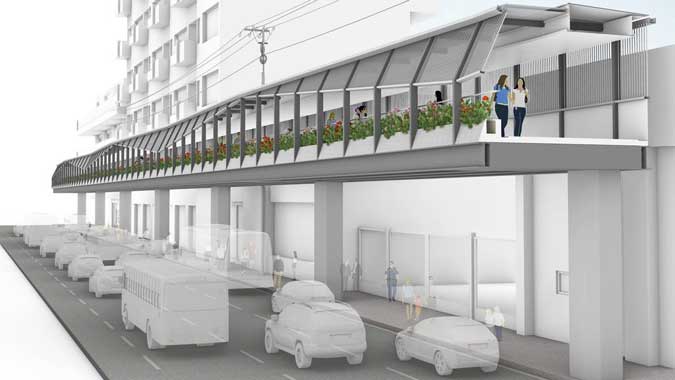
THE Asian Development Bank (ADB) has greenlit a $123-million (P5.9-billion) loan to the Philippines to build elevated walkways along the traffic-clogged Epifanio de los Santos Avenue (EDSA).
In a statement on Monday, the ADB said the loan will partly fund the P8.5-billion EDSA Greenways Project, which involves the construction of a five-kilometer covered walkway connected to mass transit stations along EDSA.
The walkways will be linked to four mass transit stations, namely Balintawak, Cubao, Guadalupe, and Taft.
The structures will be five meters wide, and have elevators and monitoring systems to allow easy access for elderly, pregnant women, children, and people with disabilities.
“The EDSA Greenways Project is an integral part of the government’s transport strategy to make Metro Manila a better place to live, work, and visit,” said ADB’s Southeast Asia Transport and Communications Director Hiroaki Yamaguchi.
Another $15-million (P721-million) loan for the project will be granted by the Association of Southeast Asian Nations (ASEAN) Catalytic Green Finance Facility, to be administered by the ADB.
The remaining $41.3 million (P1.99 billion) will come from the government’s budget, the Department of Transportation (DoTr) said in an e-mailed statement to BusinessWorld. The amount will be used for the taxes and right-of-way payments.
The DoTr said it targets to sign the loan agreement with the ADB in the next 2-3 weeks. The project is expected to start by January, and partial operations eyed by December 2021.
“These are critical dates for the DoTr to achieve partial operations by Dec 2021 and full operations of Balintawak and Guadalupe (stations) by third quarter 2022, and Cubao and Taft (portions) by first quarter 2023,” the DoTr statement sent on Monday read.
The proposed EDSA Greenways is among the 100 flagship infrastructure projects that the government hopes to fast-track before the Duterte administration ends its six-year term in mid-2022.
The project hopes to encourage Filipinos to reduce the use of private cars and shift to mass transport instead, said ADB Senior Transport Specialist for Southeast Asia Shuji Kimura in the statement.
“The project, to be built with cutting-edge technology for cantilever overhead walkways, will provide safe, inclusive, and equitable access for commuters while lowering CO2 (carbon dioxide) emissions,” he added.
The civil works contracts for the project are likely to be awarded in the first half of next year, according to the ADB.
“The project will support Metro Manila’s recovery from the coronavirus disease (COVID-19) pandemic. It is expected to create much-needed jobs during the construction period, with P3 billion ($61 million) to be spent on local raw materials,” it added.
Construction of new and improvement on existing walkways will only cause “minimal traffic disruptions,” the ADB said.
Feasibility study on the project is currently ongoing with an unnamed international consulting firm and DoTr.
A 2019 report by the ADB showed Metro Manila is the most congested city in Asia in terms of population, land area and length of road networks.
In EDSA, the average daily traffic rose by six percent to 405,882 vehicles last year compared with the 2018 levels, the ADB said citing data from the government’s Metro Manila Development Authority.
The ADB’s lending program to the Philippines is expected to hit an all-time high of $4.2 billion this year as it helps the government boost its war chest against the coronavirus pandemic, while proceeding with the infrastructure-heavy lending pipeline set last year.
In 2019, the ADB extended $2.6 billion in loans to the Philippines.
For the government’s pandemic response alone, the multilateral bank has granted $3.925 billion in budget support and project loans to the Philippines as of Nov. 23, data from the Finance department showed. — Beatrice M. Laforga with Arjay L. Balinbin
